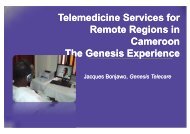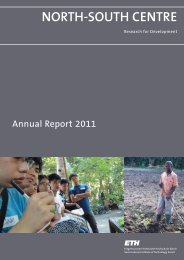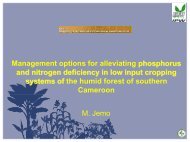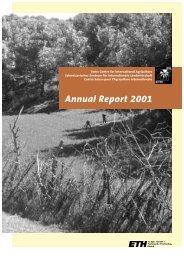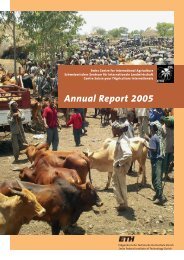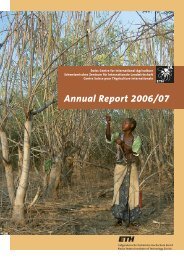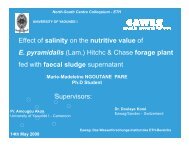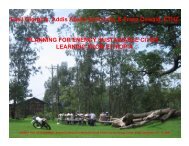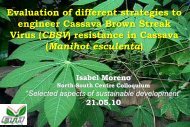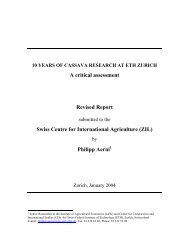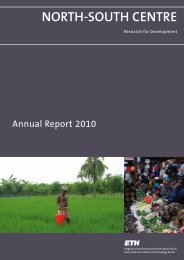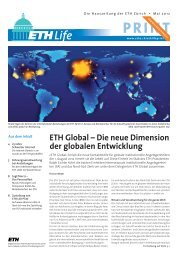NORTH-SOUTH CENTRE - ETH - North-South Centre North-South ...
NORTH-SOUTH CENTRE - ETH - North-South Centre North-South ...
NORTH-SOUTH CENTRE - ETH - North-South Centre North-South ...
Create successful ePaper yourself
Turn your PDF publications into a flip-book with our unique Google optimized e-Paper software.
e direct in the sense that you have a specific question you<br />
want to find a solution to. But R4D can also be indirect. Initially,<br />
you do basic research without focusing on solving a<br />
specific problem of society, but in the very end the outcome<br />
of your research is transferred to improve the lives of people.<br />
We have spoken about different actors being involved in<br />
R4D, about a recursive process, or – as Isabel put it – impact<br />
happening by coincidence. Based on your experiences, who<br />
defines what the demand is?<br />
Bassirou Bonfoh: In principle, you start your research based<br />
on your discipline. While conducting research you take the<br />
agenda of other people or communities into account. You<br />
integrate this in your research and by that time you are<br />
in a continuum where you cannot locate the starting<br />
point anymore.<br />
Barbara Becker: Various actors can define demand. For<br />
example, it can come from within the research community,<br />
in the sense that while conducting research you discover<br />
questions which need to be addressed. Or, demand can<br />
also be derived from direct interaction with poor people in<br />
a small village who come up with a problem which needs a<br />
solution – the local population is thus expressing demand.<br />
Urs Wiesmann: If we start again from the requirement of<br />
transdisciplinarity, the problem definition has to be found<br />
at the society-science interface – with many consequences.<br />
First, I think one cannot say from the beginning, if applied<br />
or basic research is needed. We call our approach “oriented<br />
research”, where you develop your research around the problem<br />
definition, which develops at that interface. This also<br />
means that you cannot pre-define which disciplines have<br />
to be involved – which is what I called recursive. On the<br />
demand side, we differentiate between three categories.<br />
Demand in the narrow sense, when research is seen as a<br />
knowledge pool, to which a political group, or population<br />
can refer. Second, demand can be more need-oriented, as<br />
explained by Barbara. The third category of demand – we<br />
call it “requirement-driven” – is guided by a negotiation<br />
about the visions of development. This third category can<br />
be conceptive, but it is never driven by research alone. I am<br />
strongly against leaving the so-called problem formulation<br />
to the outside world to be reflected in science – then we<br />
would be consultants and not researchers.<br />
Barbara Becker: We only addressed the demand formulation<br />
so far. I think we also have to address the implementation<br />
of results. In that respect there are two critical groups<br />
Barbara Becker<br />
Barbara Becker is the Managing Director of the <strong>North</strong>-<strong>South</strong><br />
<strong>Centre</strong> of the <strong>ETH</strong> Zurich. Her professional background is in<br />
tropical agro-ecology with research on vegetation ecology of<br />
Andean land use systems in Peru, Bolivia and Colombia and<br />
on edible wild plants in arid zones of Africa. Her experience<br />
in research management is based on former positions with<br />
the German government as a liaison officer for international<br />
agricultural research, and as a project coordinator for an<br />
information system on genetic resources. Barbara Becker<br />
serves on the Boards of Trustees of the International<br />
Institute of Tropical Agriculture (IITA) and of the Africa Rice<br />
<strong>Centre</strong> (WARDA).<br />
of people outside the research community. The policy-makers<br />
and the private sector may take up technologies or research<br />
results for further distribution. These two groups are normally<br />
not the natural allies of researchers, but play a key<br />
role in the approach of R4D.<br />
Isabel Guenther: The important point is that R4D is not a<br />
consultancy service for an externally formulated demand.<br />
What is the more important question is how one can transfer<br />
research results into action – this interface between research<br />
and society needs to be developed.<br />
Bassirou Bonfoh: In West Africa, or in Africa in general, we<br />
sometimes listen to the decision-makers saying, “If you<br />
want to do research for research’s sake, this is not what<br />
we need. We need research that we can apply.” To apply<br />
research you need extra resources allowing you to validate<br />
what you have done. These funds are often lacking. In contrast,<br />
the “Partnership Action for Mitigating Syndromes” of<br />
the NCCR <strong>North</strong>-<strong>South</strong> 1 highlights the importance of research<br />
and application.<br />
Urs Wiesmann: What is very interesting with these Partnership<br />
Actions is that in many cases you may not know in ad-<br />
1 Partnership Actions for Mitigating Syndromes (PAMS) are projects of limited financial scope and duration, implemented by local actors in<br />
partnership with scientific and non-scientific stakeholders. In close connection with research efforts, Partnership Actions implement and test<br />
approaches, methods and tools developed in research, in order to identify promising strategies and potentials for sustainable development.<br />
21<br />
FOCUS<br />
Research for development



